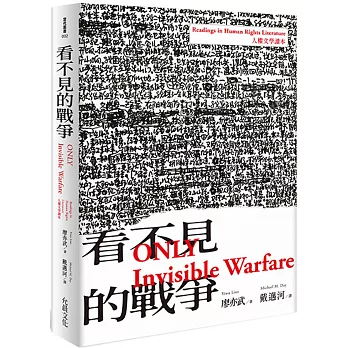出版前言 Publisher's Preface
廖志峰
二〇二三年一月十八日,作家廖亦武受邀在德國斯圖加特市政廳舉行「斯圖加特未來演講」,發表了《看不見的戰爭——一本書怎樣擊敗一個帝國?》,引起廣泛迴響,這篇演講不僅是廖亦武的創作心路歷程,也是他見證時代的紀錄與反思,於是,臺灣允晨文化特別以中英雙語版本推出,讓東西方世界更多讀者可以瞭解廖亦武這一路以文學著述反抗中共極權的歷程,這是廖亦武以中英文並行的首部作品集,也在西方世界同步發行。
On January 18, 2023, the writer Liao Yiwu was invited to give the "Stuttgart Future Lecture" at the Stuttgart City Hall in Germany,subsequently published as "Invisible Warfare - How Does A Book Defeat An Empire?", which aroused widespread reactions. This speech not only concerns Liao Yiwu’s creative journey but is also a record and reflection on his witnessing of the times. Consequently, Taiwan Yunchen Culture is especially publishing a Chinese and English edition of the speech, so that more readers in the East and West can understand Liao Yiwu’s journey of resistance against the Chinese Communist Party’s totalitarianism through his literary works. This is Liao Yiwu's first collection of writings in both Chinese and English, and it is being issued simultaneously in the Western world.
這本書還同時收錄了從二〇一九年開始寫的多篇人權文學傑作——包括聲援香港雨傘革命,被捕判刑的作家王怡,詩人王藏,六四獄友李必豐等人,以及當時為營救諾貝爾和平獎得主劉曉波遺孀劉霞的多篇呼籲,也同時收錄上述諸君的詩文,讓讀者可以同時觀照與本文對應的文學讀本,篇篇深觸人心,令人動容。本書的譯文由加拿大漢學家戴邁河(Michael Martin Day)擔綱。他於一九八〇年代到山東大學、南京大學擔任文化交流學者, 一九八六年他再至中國,結識了劉曉波、廖亦武、貝嶺等詩人,從而接觸、翻譯和研究中國地下詩歌。一九八九年六四屠殺前夕,廖亦武創作了長詩《大屠殺》,他與廖亦武合製了《大屠殺》朗誦磁帶,後來廖亦武以「反革命宣傳煽動罪」名義被捕,隔年,戴邁河以「間諜」罪名被驅逐出境。因此,這本書的合作別具歷史文獻的意義。
This book also includes several masterpieces of human rights literature written by Liao since 2019—including support for the Umbrella Revolution in Hong Kong, for writer Wang Yi who was arrested and sentenced to prison, the poet Wang Zang, and the June Fourth convict Li Bifeng, etc. Several appeals by Liu Xia, the widow of Nobel Peace Prize winner Liu Xiaobo, are also included among the poems and essays of the above-mentioned gentlemen, so that readers may reflect on the corresponding literature at the same time. Each piece is deeply touching and moving. The translation of this book is led by the Canadian-born sinologist Michael Martin Day. In 1982-1984, he was a cultural exchange scholar at Shandong University and Nanjing University. In 1986-1988, he met Liu Xiaobo, Liao Yiwu, Bei Ling, and other poets in China, and thus encountered, studied, and began translating Chinese underground poetry.On the eve of the June 4th massacre in 1989, Liao Yiwu composed the long poem "Massacre", and Day and Liao co-produced the recitation tape of "Massacre" shortly thereafter. Later, Liao Yiwu was arrested on the charge of "counter-revolutionary propaganda and incitement", while Day was accused of espionage and deported. So, their collaboration on this book gives it the unique significance of an historical document.
廖亦武坦承:我曾宣稱「為他人的自由而戰」,可認真回想,沒有任何一個帝國的囚徒,因為我寫了他或她,而改變被屠宰的命運。這種真相令人窒息——儘管如此,此「人權文學讀本」卻值得所有讀者閱讀省思並持續關注。唯有閱讀才能抵抗遺忘,而遺忘,卻正是極權政權所想要達到的威嚇效果。
Liao Yiwu has admitted, I once declared I was "fighting for the freedom of others", but I cannot seriously recall any prisoner of the empire whose fate of being slaughtered has been altered because I wrote of him or her. And this kind of truth is suffocating—---- Even so, this "Human Rights Literature Reader" is worthy of the reflection and continuous attention of all readers. Only reading can resist forgetting, and forgetting is exactly the effect of intimidation that totalitarian regimes wish to achieve.



 天天爆殺
天天爆殺  今日66折
今日66折 

























 博客來
博客來 博客來
博客來 博客來
博客來 博客來
博客來 博客來
博客來